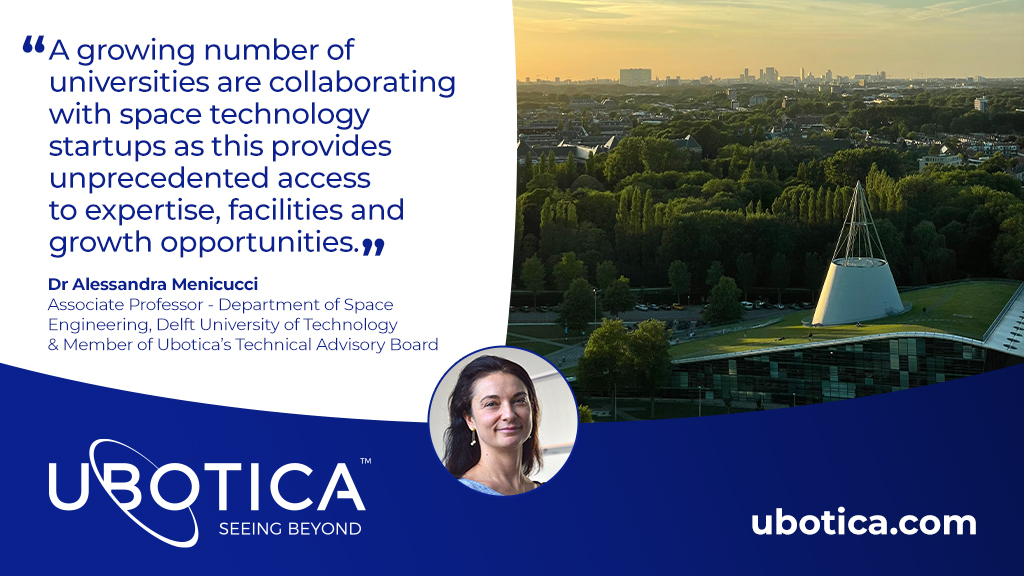How a growing number of Universities are Collaborating with Space Technology Businesses

An interview with Dr Alessandra Menicucci, Associate Professor of the Department of Space Engineering at Delft University of Technology and Member of Ubotica’s Technical Advisory Board
Q: Tell me about your background in space, and specifically your work with satellites?
A: Well, it started a long time ago with my PhD thesis. I developed a large scientific instrument for space that we flew with a national satellite. After my PhD, I joined the European Space Agency, which is also based in the Netherlands. I worked with the Technical Central European Space Agency over nine years on a number of projects and missions.
Q: Tell me about your role at Delft University?
A: I am Associate Professor of the Department of Space Engineering at Delft University of Technology. I hold a PhD in Physics (2004) from the University of Rome Tor Vergata and a Laurea in experimental physics from University of Rome La Sapienza (2000).
With my team at Delft University, we developed several very small satellites. We were the first university in the Netherlands to launch a satellite. Since then, we have developed a novel, CubeSat, and then recently, we launched an even smaller satellite, which is called a ‘Pocket Cube’, which is only five by five by 15 centimetres. So, the name is such because you can, in principle, put it in your pocket! It is a pocket-width, which is very small for a satellite. It provides end-to-end engineering opportunities for our students so they can be involved in all the phases of developing a satellite from design to manufacturing to testing and then actually operating the satellites. Now, the idea of these very tiny satellites is that they can be launched in a swarm. You have, maybe, hundreds of them and they can cooperate and provide, for example, unique coverage. Observations using the Internet of Things.
Q: What is your main focus area?
A: My research interests are focused on the development of miniaturized radiation sensors which can be distributed on-board of micro-satellites and on the radiation tolerance assurance of COTS components.
Q: What is the Delfi Space Program?
A: I am the project manager of the Delfi Space Program which aims to realize education and research by the end-to-end engineering of space missions of high relevance and impact using very small satellites. I am the co-investigator of different national and international projects in the field of radiation hardness assurance of miniaturized systems.
Q: How is Delft University key to the Space sector?
A: We have a very good reputation and are always scoring at the top of various rankings. We also have several incredibly successful Bachelor and Master programs. We keep getting more students every year. The growth doesn’t seem to be slowing down in terms of applicants and we are attracting students from all over the world. My students in their second year of semester study, need to go for a mandatory internship. It is a win-win situation, something that is beneficial for both parties.
Q: Why are universities working with Space technology startups?
A: A growing number of universities are collaborating with space technology start-up businesses as this provides unprecedented access to university space expertise, facilities and to explore new opportunities. The Delft University Aerospace and Space Engineering team are proud to be working with Ubotica.
Q: Why did you join the Ubotica Technical Board?
A: I first met the Ubotica team when we worked together on some satellite tests at ESA. We kept in touch, and I worked with the team again on the development of a very innovative platform which allows to deploy artificial intelligence on satellites. I liked how Ubotica is working on disruptive AI technologies, which of course being a researcher is very important and interesting for me.
Q: What is your role on the Ubotica Technical Advisory Board?
A: I have been working with the Ubotica team for three years as a space technology expert. My role is to advise Ubotica on strategic choices and strategic vision for future projects. And I enjoy doing this.
Q: How do you see the future for Ubotica?
A: Ubotica has a very bright future as the market in evolving very quickly opening up numerous opportunities across various industries. We are also experiencing new approaches to space engineering. We are seeing very interesting technology and new opportunities. Startup companies, like Ubotica are daring to explore new possibilities, which is something that I think is helping the market to evolve. Having the right team members with the right mentality and technology is central to the success of new companies and this is why we are seeing so many universities partner with start up space companies.
Q: How is Space becoming more relevant to everyday life on earth?
A: Ubotica is involved in so many different areas from assisting with climate change, detecting forest fires to helping farmers. This is a prime example of how data and images from Space are becoming useful to everyday business and helping to improve the daily life of millions of people.
